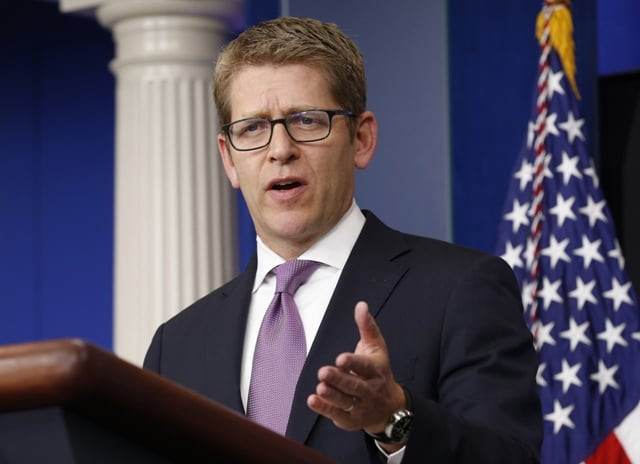White House happy to talk peace terms with Taliban
Spokespersons lay stress on US commitment to long-lasting peace and security in the region.

"We have long been clear that this is something that we will discuss and negotiate with the Afghan government. We have made clear that the options that are available include the zero option," says White House Press Secretary Jay Carney. PHOTO: REUTERS
While confirming media reports that options on post-2014 security engagement with Afghanistan include the so-called 'zero option' in terms of the presence of US troops, Washington spokespersons also said that the United States will not repeat mistakes made in the '80s and '90s.
The US comments came after early bumps in the road to Afghan peace process, with the Taliban announcing a temporary closure of its Doha political office – a move that follows Kabul's abstinence from the talks on account of objections to the mode of negotiations.
"We've seen the reports about the Doha office, and as President [Hamid] Karzai and President [Barack] Obama said, the surest way to a stable, unified Afghanistan is for Afghans to talk to Afghans and it is up to the Taliban to decide if they are serious about negotiations," White House Press Secretary Jay Carney said.
At a press briefing, he acknowledged that the reconciliation process has been difficult and will continue to be so and indicated that if the Doha move does not progress, the Obama Administration remains open to exploring other avenues to Afghan peace.
"And if this effort, the Doha office effort does not succeed, we will pursue other means and other avenues for peace, because ultimately peace in Afghanistan depends on reconciliation between Afghans."
State Department, spokesperson Jen Psaki
said the US and its allies do not want to repeat the mistakes of the past and that Afghanistan would not be left alone.
"We are committed - just to give you a broad overview of our approach - to continuing to support a fully sovereign, democratic, and united Afghanistan. We have been clear in public and in private, as have many of our allies and partners in ISAF and in the broader international community, that we do not intend to repeat the mistakes of the '80s and '90s, and that as the Afghans stand up they won't stand alone."
About the challenging reconciliation process in Afghanistan, she said that they were trying to solve the latest set of problems that had arisen.
"We're trying to still move it forward despite the difficulty of the process. The opening of the Taliban office just a couple of weeks ago, of course, was intended to facilitate negotiations with the Afghan High Peace Council. We believe that misunderstandings that arose in the context of the opening should not stand in the way of moving forward on reconciliation, if the Taliban wish to do so. And we'll continue to support and reiterate our call for that process to move forward."
Asked if Washington would like to set a timeline for progress on Afghan reconciliation in view of the 2014 draw down and the upcoming Afghan presidential elections, the spokesperson replied "Certainly, we would like to see a reconciliation process move forward sooner rather than later, but we certainly understand the bumps in the road that we have experienced – I'm not going to give a timeline. Obviously, we continue to be focused on it."
Afghan residual force
On the question of keeping a potential residual US force in Afghanistan after the 2014 withdrawal of combat troops, the White House official spokesperson said that a final decision has not been taken on this.
"We have long been clear that this is something that we will discuss and negotiate with the Afghan government." Carney made it clear that the options that are available include the so-called zero option.
"But the focus we have in these negotiations with the Afghan government is on how to implement our two policy objectives here beyond 2014, which is to continue to pursue the remnants of al Qaeda in the Afghan-Pakistan region, one; and two, how do we continue to train and equip Afghan security forces so that they can protect the stability and integrity of the Afghan government. So those are our policy objectives, and we will continue to work with the Afghan government as we look at the options available to us post-2014."
The White House press secretary emphasised these are ongoing conversations and are part of a bilateral security agreement discussion that the US is having with the Afghans.
Regarding the long-term US ties with Afghanistan, he referred to the broader commitment to Afghanistan as reflected in the strategic partnership agreement.
"We will continue to be committed to Afghanistan beyond 2014 in our robust civilian assistance and our support for the Afghan National Security Forces."



















COMMENTS
Comments are moderated and generally will be posted if they are on-topic and not abusive.
For more information, please see our Comments FAQ